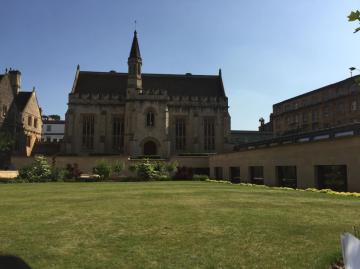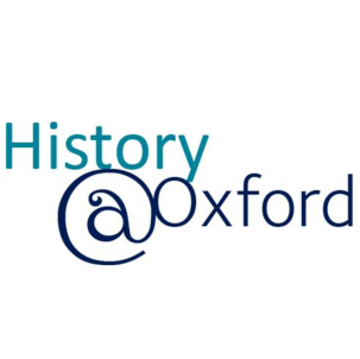You make your Oxford experience your own
Connor Beattie has just finished his 2nd year studying Ancient and Modern History (AMH) at Magdalen College. Before coming to Oxford, he studied at two state schools in North Wales. Firstly the Elfed High School in Buckley for GCSE and then at Coleg Cambria in Wrexham for A-Levels.

I am currently writing these words whilst sat outside on freshly trimmed lawns, basking in sunlight, and watching a game of croquet (a game I have never quite gotten the hang of). Other sections of this blog have been written in the lofty upper floor of the Radcliffe Camera, down in the tunnels of the Gladstone Link, and much whilst sitting in my room. The point is that Oxford is extremely diverse, in terms of the places you can study, the work you do and the people you meet. Anyone and everyone can fit into Oxford and if there is one thing I have learnt over my two years here is that you make your Oxford experience your own. There is no such thing as a ‘typical life’ at Oxford because Oxford gives you so many amazing opportunities to mould your degree and time here. In the following I have endeavoured to explain what makes Oxford such a great place to study from a student perspective, hopefully giving you some insider information that is not readily available elsewhere.
Choice
What sets Oxford apart is the sheer range of choices it offers which allows you to mould your degree to fit your interests, both as a Fresher and as you progress through your degree. This is even more true of Ancient and Modern History; I stand out as a striking example. I came to Oxford knowing that I wanted to focus on Roman History and during my first year two of the four papers I sat were Roman (246-146 and Augustan Rome). This increased in my second and third year to five out of seven. I personally encourage the type of specialisation that Oxford allows because it allows you to develop a much deeper understanding of the society you are interested in and appreciate how this can change over time. Certainly, studying 146-46 was extremely useful even for studying the period from Nero to Hadrian simply because of the power that very history had in the 1st/2nd AD Roman ideology, and it was from my first-year paper 246-146 that an idea for my thesis came. Equally, if I had wanted to, I could have had almost no crossover in any of my papers: Greece, Rome, Dark Ages Britain, Medieval Europe, Renaissance France could all have been picked. For me this ability to mould your degree is a central reason for Oxford producing some of the best and most distinguished historians in the world. It is why anyone can come to Oxford, fit in, and most importantly make their degree their own.

Libraries
This might seem an obvious one, but before I came to Oxford I had no idea just how amazing the Oxford library system was. In short, you have access to three tiers of library: your college library, faculty libraries, and the main Bodleian library. In my experience college libraries normally have most of the books you need, which is a great advantage if you don’t fancy travelling far, but if they don’t, or someone has taken them out then both the Faculty library or the Bodleian library (which is a legal deposit library; the only other University in the UK to have one is ‘the Other one’) will have a copy. I have never been in a situation where I could not get access to a book I needed within 30 minutes. This is especially useful if you have other research interests outside the papers of your degree (more on that later).
Two Faculties
Part of the joy of studying Ancient and Modern History is being a Joint Schools candidate and therefore a member of both the Classics and History Faculties. Again, this is not something that is generally known before you get to Oxford, but the Faculties host a huge range of lectures and seminars that are not directly related to papers being taught. I can get upwards of twenty emails a week from the Classics Faculty telling me about various events going on and each I have been to has been extremely engaging. They really help broaden your horizons and offer insights you may never have considered gaining. It is worth emphasising that Oxford is not an exam machine as much as you might be told this. In my experience the ethos here, in history at least, is to give you an outstanding education, allow you to develop as an individual both academically and socially, and give you opportunities to broaden your understanding of history and human relations. By virtue of this you will do great in exams.
Tutorial System
As I am sure you will have been told many times, Oxford is famed for its tutorial system where you get one-on-one or two-on-one contact with world-leading academics every week. This may sound scary, but it is truly wonderful, especially if, like myself, you were normally in classes of 20-30 in school. Tutorials are not there for you to be lectured at but to allow you to develop your own ideas: in my experience what sets apart Oxford undergraduate historians the focus not merely on reciting historiography but on developing your own interpretations of the sources and devising your own arguments. In my tutorials I probably spend more time talking than my tutors do (I have been accused of liking the sound of my own voice) and they act as a guiding hand, pointing out the flaws in my views, helping me to fit my views into the wider historiography and helping me to strengthen my arguments. Each tutor certainly has their own style, but part of the joy of the tutorial system is experiencing the personalities and teaching styles of different academics.
Opportunities
It seems fitting to end on the theme that I have been trying to push through this whole blog, Oxford is a land of opportunities to pursue your own interests outside the papers your sitting, something mostly overlooked in trying to decide where to apply. Most colleges have some form of research or travel grants which can fund you in the development research interests: I have used my college’s travel grant to visit Istanbul and Rome. History and Joint Schools also provide free ‘language for historians’ classes each year which will allow you to continue languages you have learnt in school or start up completely new ones. I started learning Latin from scratch in my second year! Finally, there are a number of scholarships that you can apply for to fund extra research, in particular the Laidlaw Scholars Undergraduate Research & Leadership Programme. I personally applied for this over Christmas and won £6,000 for research designed by myself for this summer. It is these sorts of opportunities that set Oxford apart.
I hope this has given you a taste of what you can get out of Oxford and the ways in which you can make an Oxford education your own.




